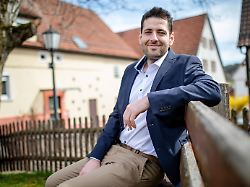Integration talk with Markus Lanz
“Appointment at the dentist is easier than at the German embassy”
By Marko Schlichting
October 25, 2023, 6:00 a.m
There are a lot of reports these days about migrants who find it difficult to integrate. With Markus Lanz, a man has his say about whom this cannot be said. The guest, who fled Syria in 2015, is now mayor.
When Ryyan Alshebl talks about his life, you wouldn’t believe that he has only been living in Germany for eight years. His German is perfect and his Baden accent is unmistakable. In 2015, Ryyan Alshebl decided to flee Syria to Germany in order to avoid having to do military service in his home country. At Markus Lanz he reports on his escape from Syria. He came to Germany illegally. “The people in my village don’t consider me Syrian; I’m considered German,” says Alshebl, who now has dual citizenship and was elected mayor of his community of Ostelsheim six months ago. Ostelsheim is a village with around 2,500 inhabitants, about 60 kilometers from Karlsruhe.
What does drowning feel like?
In spring 2015, Alshebl set off on the arduous journey to Germany. He can say “good morning” and “good afternoon”. He learned German through integration courses and through television. “And of course contact with people is the most important thing,” says Alshebl. It was clear to him from the start that he wanted to come to Germany. His brother lives here and was studying in Karlsruhe at the time. “And then Germany is a country with a lot of prospects,” he says with a smile.
He sets off with three friends. First he contacts a smuggler in Istanbul. “He was responsible for the processing. In Istanbul you saw that he was a nobody in this process. You don’t get to know the actual smuggler.”
There is a meeting in Istanbul. Alshebl has to pay 4,000 euros to flee to Germany. Then he waits in a small apartment for the call telling him that the real escape is beginning. He has half an hour to catch a bus heading towards the sea. After boarding a boat on the coast, he has to leave his luggage behind because there are too many people on board. “Then we drove to the Greek island of Lesbos that night. We had nothing, just our identity cards and a little money,” says Alshebl. It is pitch black on the journey, the waves are rising higher and higher, water is running into the boat. “And then suddenly you ask yourself what it would feel like if you drowned.”
Embassy prevents legal entry
When you arrive on Lesbos, Alshebl has to register. In 2015 this means being tolerated in Greece, which you have to leave within three months. “Back then, no one wanted to stay in Greece,” he says.
Migration researcher Gerald Knaus explains why. “German courts have recognized that life for refugees in Greece is undignified. Bed, bread and soap are not guaranteed for recognized asylum seekers there. People can end up on the streets, receive no social benefits and cannot secure their livelihood. That is “This is the case in several EU countries,” says Knaus. Things are worse in Hungary, for example, where it is forbidden to apply for asylum. Hungary processed forty asylum applications in 2022, but they were not submitted in the country. “This is absolutely illegal and has been condemned by the European courts. But the Hungarians don’t care about the European courts,” says Knaus.
It takes Alshebl a total of two weeks to escape to Germany. At that time he was one of the illegal refugees. He originally wanted to enter Germany legally. To do this, he tries to get an appointment at the German embassy in the Lebanese capital Beirut. “But I didn’t get one. Because you had to pay money for it.” Alshebl speaks of corruption with Markus Lanz. “The appointments are arranged by private offices and they sell these appointments. My little brother, for example, had to pay 400 euros. He gave the money to a private person. Nobody understood what his function was. But in the end he had an appointment.” This story causes horror among the talk show guests. Even Paul Ziemiak, general secretary of the federal CDU from 2018 to 2022, says he didn’t know anything about it and wants to get in touch with the Foreign Office. The Foreign Minister at the time was the current Federal President Frank Walter Steinmeier.
Even today, Ryyan Alshebl is angry about the situation in the embassies that he experienced: “Getting an appointment at the dentist is easier than getting one at a German embassy. My impression is that there are people there who are trying everything to prevent that you get a visa.”
He says his community can still take in a few refugees. But not for long. He advocates “that we try to largely curb migration from safe countries of origin.” And he advocates that people who receive three or four years of citizen’s benefit must do social work for a year, “regardless of where they come from.”
